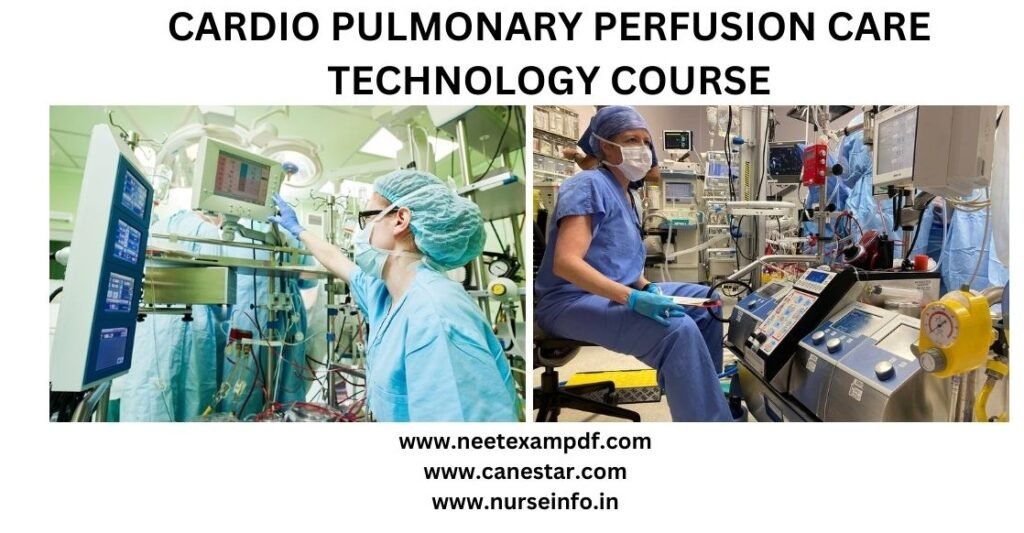CARDIO PULMONARY PERFUSION CARE TECHNOLOGY COURSE
CARDIO PULMONARY PERFUSION CARE TECHNOLOGY COURSE – COURSE, ELIGIBILITY, DURATION, COURSE CURRICULUM, FEE STRUCTURE, CAREER OPPORTUNITY (ABROAD) AND SALARY
COURSE
Cardio Pulmonary Perfusion Care Technology, also known as Perfusion Technology or Perfusionist Training, is a specialized field of healthcare that involves operating and maintaining heart-lung machines during cardiac surgeries and other medical procedures. Perfusionists are responsible for ensuring the circulation of oxygenated blood to the patient’s body while the heart is temporarily stopped during surgery.
ELIGIBILITY
- Educational Background: Typically, a bachelor’s degree in pulmonary perfusion care technology or a related field is required for admission to a master’s degree program in India. The bachelor’s degree program should be from a recognized university or institution.
- Minimum Marks: Most universities and institutions have a minimum percentage or CGPA requirement for admission. Generally, a minimum of 35 % marks in the qualifying examination is required. The specific minimum marks required may vary among institutions.
COURSE DURATION
The duration of the cardio pulmonary perfusion care technology program is generally three years, including both theoretical coursework and clinical training.
COURSE CONTENT
- Anatomy and Physiology
- Biochemistry and Pathology
- Pharmacology, Pathology and Clinical Microbiology
- Principles of Perfusion Technology
- Introduction to Surgery and CSSD
- Cardio-Pulmonary Bypass and Perfusion Technology
- Cardio-Pulmonary Bypass and its complications sterile techniques and surgical asepsis maintenance
The Perfusion course program is designed to train individuals in the field of perfusion technology, enabling them to become perfusionists who operate and manage heart-lung machines during cardiac surgeries and other medical procedures. While the exact curriculum may vary depending on the educational institution and country, here is a general outline of a typical Perfusion course program:
- Introduction to Cardiovascular Physiology: This course provides an overview of the cardiovascular system, including the anatomy, physiology, and function of the heart, blood vessels, and circulation.
- Medical Sciences: Students learn fundamental medical sciences such as anatomy, physiology, biochemistry, and pharmacology. These courses provide a strong foundation for understanding the human body and its response to perfusion.
- Perfusion Technology Principles: This coursework covers the principles and theories behind perfusion technology. Topics include the operation and maintenance of heart-lung machines, cardiopulmonary bypass techniques, blood gas analysis, patient monitoring, and managing perfusion support during surgery.
- Perfusion Techniques and Procedures: Students gain hands-on training in perfusion techniques and procedures. This includes learning about cannulation techniques, priming and managing the bypass circuit, initiating and terminating bypass, monitoring patient parameters, and adjusting perfusion settings as needed.
- Extracorporeal Circulation Management: This course focuses on the management of extracorporeal circulation during cardiac surgery. Students learn about anticoagulation, hemodilution, blood conservation techniques, temperature management, and other aspects of maintaining optimal perfusion.
- Clinical Practicum: A significant component of the program involves clinical rotations in affiliated hospitals or healthcare centers. During these rotations, students observe and actively participate in perfusion procedures under the supervision of experienced perfusionists. This provides hands-on experience in a clinical setting and allows students to apply their theoretical knowledge and develop practical skills.
- Perfusion Equipment and Technology: Students learn about the various perfusion equipment and technologies used in cardiac surgery and other procedures. This includes understanding the functioning and calibration of heart-lung machines, oxygenators, blood pumps, temperature management devices, and monitoring equipment.
- Research and Professional Development: Some programs may include research projects, case studies, or assignments related to perfusion technology. Additionally, students may receive training in professional skills such as communication, ethics, teamwork, and patient care.
- Certification Exam Preparation: Programs may offer guidance and preparation for certification exams administered by professional organizations such as the American Board of Cardiovascular Perfusion (ABCP) or equivalent certifying bodies in other countries. Successful completion of these exams is often required for professional practice as a perfusionist.
FEE STRUCTURE
The fee is between 50,000 to 5 lakhs for complete three years.
CAREER OPPORTUNITY
Completing a Perfusion course can open up several career opportunities in the field of perfusion technology. Some potential career paths and opportunities for perfusionists include:
- Clinical Perfusionist: The most common career path for perfusionists is working as clinical perfusionists in hospitals or healthcare centers. As a clinical perfusionist, you will be responsible for operating and managing heart-lung machines and other life support systems during cardiac surgeries and other medical procedures. You will work closely with cardiac surgeons and other members of the surgical team to ensure optimal patient care during procedures requiring cardiopulmonary bypass.
- Cardiovascular Research: With further education and experience, perfusionists can contribute to cardiovascular research. They can work in research institutions, academic settings, or pharmaceutical companies, participating in studies and clinical trials related to perfusion technology, cardiovascular diseases, or medical device development.
- Teaching and Education: Perfusionists with advanced degrees and experience may pursue careers in academia or teaching positions. They can contribute to perfusion education by teaching perfusion technology courses, supervising clinical rotations, or conducting research in educational institutions.
- Quality Assurance and Equipment Management: Perfusionists can also work in quality assurance roles, ensuring the safe and effective operation of perfusion equipment and adherence to regulatory standards. They may be involved in equipment selection, maintenance, calibration, and safety protocols in hospitals, healthcare facilities, or medical equipment companies.
- Perfusion Department Management: With experience and leadership skills, perfusionists can take on management roles within perfusion departments. They may oversee the operations, staffing, budgeting, and quality improvement initiatives within the perfusion department.
- International Opportunities: Perfusionists may have opportunities to work internationally, particularly in countries where the field of perfusion technology is growing or where there is a demand for skilled perfusionists.
SALARY
In India, the average annual salary of a perfusionist typically ranges from ₹3 lakhs to ₹12 lakhs or more. Entry-level perfusionists or those with less experience may start with salaries around ₹3 lakhs to ₹5 lakhs per year. With increasing experience and expertise, the salary can go up to ₹8 lakhs to ₹12 lakhs or higher for senior perfusionists
In countries like the United States, Canada, Australia, and several European countries, perfusionists generally earn higher salaries compared to many other countries. The average annual salary for perfusionists in these countries can range from $80,000 to $150,000 or more, depending on various factors.
If you need more information, comment us below or email us.
Thank you.

